#Parental abuse
Text
everyone talks about cutting off a toxic parent
but no one ever talks about the pain of wanting a parent but knowing yours cannot love you the way they should
#toxic mom#toxic mother#toxicmommy#toxic family#toxic parents#child abuse#narcissistic abuse#parental abuse#mental abuse#emotional abuse#abuse survivor#actually abused#why my family don't love me?#i hate my family#family issues#dysfunctional family#family#dysfunctional household#dysfunctional parents#dad issues#toxic father#father#toxic dad#emotionally unstable mother#emotionally immature parents#narcissistic mother#childhood trauma
9K notes
·
View notes
Text
shoutout to all the kids with good people as bad parents. the parents who were sympathetic, honest and kind to everyone until you were the next in line. the parents who loved the entire family except you. the parents who preached about acceptance, warmth and kindness, but never offered it to you. the parents who were understanding to friends, cousins or siblings, but not to their own children. the cognitive dissonance is surreal, but i promise it is not a reflection of your own worth. you deserve more.
#recovery#mental health#self care#self love#positivity#reminders#healing#be kind to yourself#toxic parents#toxic family#parental abuse#childhood trauma#emotional neglect#mine.#note to self mostly.
1K notes
·
View notes
Text
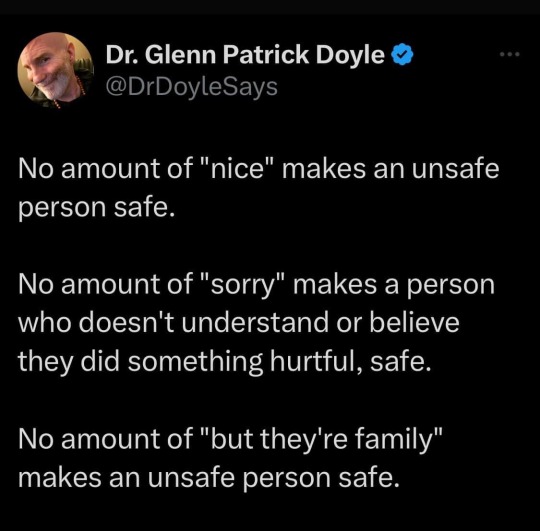
#toxic parents#emotional abuse#trauma#aftermath#parental abuse#accountability#repentance#manipulation#dysfunctional family#boundaries#trust#trust issues#ptsd#relationship problems
1K notes
·
View notes
Text
thank you parents for making me feel like an unlovable burden !!!!!!
#styr0blr#styroblr#cvtaddict#self h@rm#depressing shit#sh pics#tw depressing thoughts#tw styro#tw s3lf harm#parental abuse#parental issues#mommy issues#daddy issues#actually bpd#bpd problems#bpd#bpd thoughts#bpd safe#bpd vent#hpd vent#actually hpd#hpd#hpd safe#bipolar disorder
746 notes
·
View notes
Text
Things people label as abuse when it's done to a partner that parents somehow get away with
Hitting/spanking. Abusive/toxic when it's a partner but fair discipline when it's a child.
No privacy (no privacy = going through their phone, tracking their location, attending therapy appointments, etc.). Abusive/toxic when it's a partner but good parenting when it's a teenager.
Emotional neglect. Abusive/toxic when it's a partner but "not the parents' fault" when it's a child.
Overworking them. Abusive/toxic when it's a partner but earning their keep when it's a child.
Doing things to purposely make them cry. Abusive/toxic when it's a partner but hilarious when it's a kid.
Breaking their stuff/deleting video game progress. Abusive/toxic when it's a partner but fair discipline when it's a child.
Forcing affection when they don't want to. Abusive/toxic when it's a partner but teaching them good manners when it's a child.
Locking them in a room that they can't escape. Abusive/toxic when it's a partner but "they've got to learn one way or another" if it's a child.
Expecting them to suppress their emotions. Abusive/toxic if it's a partner but teaching them to be mature if it's a child.
Getting angry when they ask a question/challenge your logic/need clarification. Abusive/toxic if it's a partner but teaching them to not talk back if it's a child.
Not letting them eat anything unless it's what you put in front of them (that includes not letting them get anything for themselves). Abusive/toxic when it's a partner but teaching them to be grateful if it's a child.
If you've ever labeled any of these things as abuse when an adult opens up about their experiences but will defend parents who do the same thing, you need to reevaluate yourself.
DNI: Narcissistic/Borderline/Anti-social/Histrionic abuse believers.
#tw abuse#parental abuse#toxic parents#npd safe#cluster b safe#emotional abuse#physical abuse#mental abuse#aspd safe#hpd safe
3K notes
·
View notes
Text
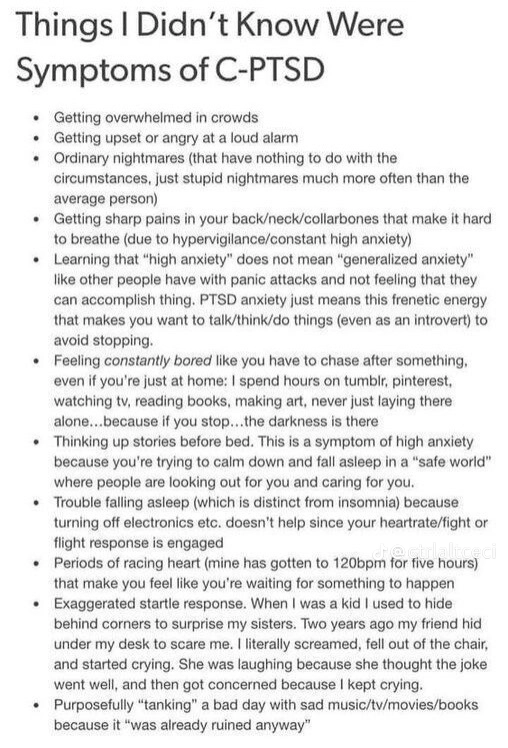
being like this and living with someone who doesn't understand is so hard.
#narcissistic abuse#parental abuse#cptsd life#complex trauma#just cptsd things#actually cptsd#cptsd recovery#living with cptsd#cptsd problems#mental health#mentally fucked#actually mentally ill#overwhelmed#therapy#coping#mental illness
2K notes
·
View notes
Text
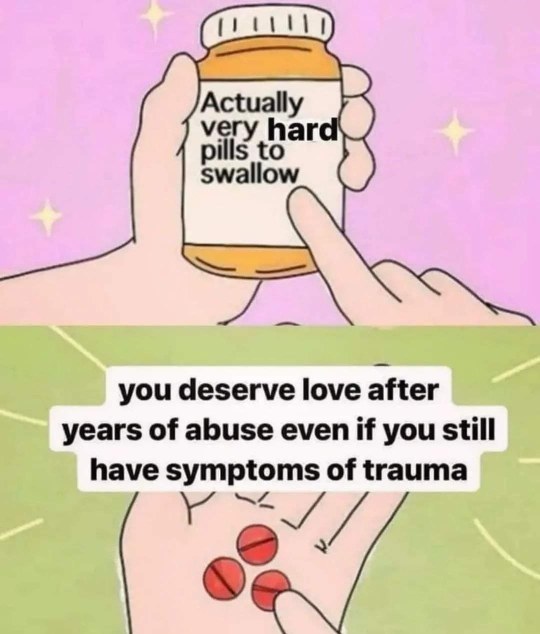
#traumagenic osdd#trauma#just cptsd things#living with cptsd#cptsd recovery#cptsd problems#abuse survival#parental abuse#mental abuse#emotional abuse#verbal abuse#tw abuse#childhood trauma#medical trauma#spoonie#chronically ill#chronic illness#disabled life#disability#mental illness#disabled community#invisible disability#chronic disease#mental heath support#complex ptsd#ptsd#actually ptsd#ptsd recovery#living with ptsd#actually cptsd
2K notes
·
View notes
Text
here’s a friendly reminder for survivors of any sort of abuse that
It wasnt your fault
You are strong
You didnt ask for it
No one gets to invalidate your experience
If someone invalidates your experience, you get to dump their ass
#i suffered through a friend abusing me#physically emotionally and mentally. These reminders save me everyday#childhood trauma#trauma#emotional abuse#parental abuse#sa survivor#abuse survivor#abuse recovery#child abuse#tw abuse
1K notes
·
View notes
Text
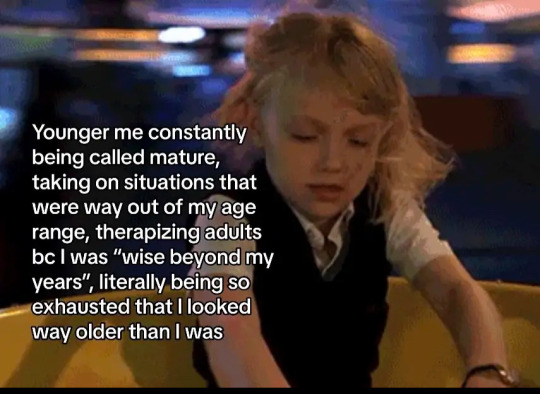
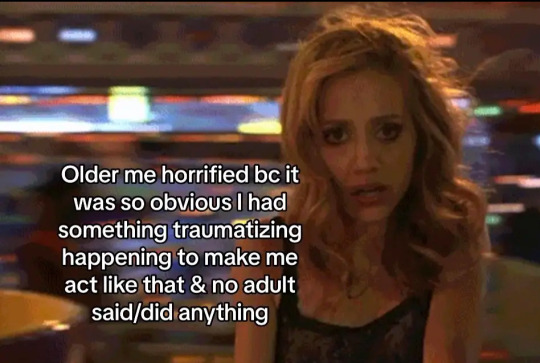
#I wanna fucking off myself Jesus Christ#why did nobody help?#I’m so tired of them saying “well we didn’t know#THERE WERE SIGNS LITERALLY EVERYWHERE#bpd#mental health#actually bpd#mental illness#bpd shit#actually borderline#bpd shitposting#bpd problems#bpd mood#bpd meme#parental abuse#tw sa implied
1K notes
·
View notes
Text
'you're so sensitive'
THANKS
i was never fully allowed to express my emotions as a child because when i did i would get yelled or made fun of
#toxic mom#youngest sibling#youngest child#toxic mother#toxic family#toxic parents#dysfunctional parents#parental abuse#parental issues#dysfunctional family#family issues#daddy issues#narcissistic mother#mommy issues#emotionally unstable mother#narcissistic abuse
901 notes
·
View notes
Text
Friendly reminder that "I bought you nice things", "I gave you food and a roof over your head" and "I've never hit/physically hurt you" does not justify emotional abuse, neglect or parentification.
And if when being confronted they make you feel guilty and get defensive and passive aggressive saying some variant of "Oh well I must've been such a terrible parent!" and tell you how they bought you nice things for your birthdays and how your basic needs were met, that does not make your feelings and trauma invalid. You're not a bad person or ungrateful for feeling hurt.
#tw mentions of abuse#c ptsd#parental abuse#neglect#emotional neglect#parentification#tw parental abuse
586 notes
·
View notes
Text
Having survived abuse from people with mental illnesses, I know the urge to warn others to be wary of those mental illnesses. I know how often it can feel like that is your only power in life…the only action you can take against what you went through. But listen. Just because a mentally ill person caused you complex trauma, doesn’t mean you get to generalize and slander and malign every person with that mental illness.
You do not have to forgive your abusers. but you do have to heal without spreading stigma and misinformation. you do have to heal without antagonizing or dehumanizing others who are also just trying to heal. you have to help break the cycle. because nobody can heal alone.
#cluster b disorders#childhood trauma#abuse survivor#parental abuse#parental trauma#cptsd recovery#complex trauma#trauma recovery#cptsd healing#mental health representation#disability advocacy#adverse childhood experiences#npd positivity#bpd problems#personality disorders#manic depressive#did osdd#aspd safe#npd safe#bipolar disorder#psychotic disorders#mental health education#mental illness advocacy#cluster b#hpd safe#borderline personality disorder#social justice#antisocial personality disorder#narcissistic personality disorder#histrionic personality disorder
923 notes
·
View notes
Text
Me as a teenager: I really relate to victims of child abuse. Weird, given my parents are amazing.
Me now: oh.
#parental abuse#emotional abuse#emotional neglect#child abuse#toxic family#family abuse#emotional wounds#dysfunctional family#ctpsd#trauma
881 notes
·
View notes
Text
I always find it really annoying when parents say "oh, they're just doing that for attention" when they find out their child is hurting themselves.
...Why not give it to them, then? Why is your child so deprived of attention that they're resorting to self-harm and other dangerous behaviour in an attempt to get it?
Even if needing attention was the sole reason they're doing it (which it often times isn't), that's still a sign that you've been neglectful of your child's physical and emotional needs.

#tw.self harm#parental abuse#toxic parents#emotional neglect#child abuse#actually mentally ill#mentally unstable#npd safe#bpd safe#aspd safe#hpd safe
2K notes
·
View notes
Text
Most parents decide they're going to use their child's innate naivety and trusting nature to instill a sense of wonder. Santa Claus, the tooth fairy, mermaids are real, Disneyland. All that.
My parents used it to create an invisible panopticon that only existed in my mind so they could easily deny its existence if I reported it to anybody.
Basically, was told at a very young age, that there were tiny hidden cameras I couldn't see everywhere in my home, and in my clothes, and in my school. They gave my stepdad 24/7 round the clock acsess to view me whenever he wanted to. He said these cameras could not only record my face, voice and actions, but that they had special technology that could read and translate my very thoughts.
I was at the "mermaids and unicorns are real" age, so not only did all of this seem totally plausible, it terrified me. I was changing under the covers of my bed, worried he could see me on the toilet or in the shower, and worst of all I started monitoring and censoring my own thoughts, convinced he could hear every one of them.
My mum noticed I had started taking longer to get dressed and ready than I used to, and asked why I was wasting time trying to get dressed in bed. When I told her about the cameras she tried to convince me they weren't there, and even did a sweep of my room to prove it to me, but I didn't believe her. I thought my step dad had so much power he could even hide these mind reading micro cameras from other adults. She just kind of brushed it off, assuming this was some silly thing I'd be over in a week.
I wasn't.
He kept reminding me of them, so I continued to be scared of them.
The second time my mother heard of these invisible cameras were when another parent, concerned, told her about it.
See I'd been playing at her daughters house, and I was asking her to call my step dad to ask permission for every minor thing I did.
"Can you call my dad and ask if I'm allowed to play in the garden?" "Can you call my dad and ask if I'm allowed to watch TV?" "Can you call my dad and ask if I'm allowed ketchup on my chips?"
She would assure me she'd asked my mum and my mum said it was fine, but I was adamant it be my step father she call. Eventually, she asked me why I was so concerned about his permission to do these things I'd been doing fine every other time I'd been at her house.
"Because he's the one with the cameras."
I said it so naturally. Like every family had a parent who had the cameras and another who was under surveillance by them. I was worried that if I conveyed the frozen still fear I felt over these hidden cameras, it would seem that I had something to hide.
"There's no cameras in our house so you don't have to worry about it." She tried to convince me.
"Oh no, they're in my clothes" I said. "They're so tiny they could be in a zip or a button or on my shoe laces and nobody would know."
She was, understandably, freaked out by this.
I'm not sure if she beleived my step dad had just sent me bugged into her home like a pervert or something, but I think when I started talking about how it can hear my thoughts like a regular camera can record voices, she realised that this was something else.
My mum pretended that I'd made it up and was lying for attention, even though she knew I wasn't. She knew that her husband had been terrorising me with these fake omnipotent cameras for weeks to the point I was losing sleep and dreaming about them. It was just easier for her to paint me as some kind of freakishly and manipulative child. It was really messed up, this woman's daughter was my only friend, I'd be friendless and alone if she decided she didn't want her daughter learning this behaviour from me.
The last time it was brought up to her was by my aunt. I'd had a bonding day out with her that ended in me crying on her couch after dinner. I vented about the cameras and how much pressure they were putting on me. I said I felt scared to be out with anyone, because if my daddy was watching and he heard their thoughts and he didn't like them, he could stop them from ever seeing me again. I knew she didn't like him, and he didn't like her. All he needed was video proof that she thought bad things about him and he'd have the perfect excuse to cut her out of my life. I didn't want that, I loved my aunt dearly.
My mum tried to pull the same "oh she's just making it up for attention" bit, but my aunt knew my step dad, and she knew he was exactly crazy and twisted enough to torture me like that. She believed me over my mother, and after that I never heard about the cameras again.
Over the weeks I wasn't threatened with them, I slowly started to think about them less and less. And by the time I stopped thinking about them entirely, I'd stopped believing in tooth fairies and unicorns and high tech invisible cameras that could hear my thoughts.
I never forgot about them though.
#mental abuse#emotional abuse#emotionally immature parents#narcissistic abuse#raised by narcissists#vent post#toxic parents#complex trauma#parental abuse#childhood trauma#tw child abuse
267 notes
·
View notes
Text
Why we don’t like it when children hit us back
To all the children who have ever been told to “respect” someone that hated them.
March 21, 2023
Even those of us that are disturbed by the thought of how widespread corporal punishment still is in all ranks of society are uncomfortable at the idea of a child defending themself using violence against their oppressors and abusers. A child who hits back proves that the adults “were right all along,” that their violence was justified. Even as they would cheer an adult victim for defending themself fiercely.
Even those “child rights advocates” imagine the right child victim as one who takes it without ever stopping to love “its” owners. Tear-stained and afraid, the child is too innocent to be hit in a guilt-free manner. No one likes to imagine the Brat as Victim—the child who does, according to adultist logic, deserve being hit, because they follow their desires, because they walk the world with their head high, because they talk back, because they are loud, because they are unapologetically here, and resistant to being cast in the role of guest of a world that is just not made for them.
If we are against corporal punishment, the brat is our gotcha, the proof that it is actually not that much of an injustice. The brat unsettles us, so much that the “bad seed” is a stock character in horror, a genre that is much permeated by the adult gaze (defined as “the way children are viewed, represented and portrayed by adults; and finally society’s conception of children and the way this is perpetuated within institutions, and inherent in all interactions with children”), where the adult fear for the subversion of the structures that keep children under control is very much represented.
It might be very well true that the Brat has something unnatural and sinister about them in this world, as they are at constant war with everything that has ever been created, since everything that has been created has been built with the purpose of subjugating them. This is why it feels unnatural to watch a child hitting back instead of cowering. We feel like it’s not right. We feel like history is staring back at us, and all the horror we felt at any rebel and wayward child who has ever lived, we are feeling right now for that reject of the construct of “childhood innocence.” The child who hits back is at such clash with our construction of childhood because we defined violence in all of its forms as the province of the adult, especially the adult in authority.
The adult has an explicit sanction by the state to do violence to the child, while the child has both a social and legal prohibition to even think of defending themself with their fists. Legislation such as “parent-child tort immunity” makes this clear. The adult’s designed place is as the one who hits, and has a right and even an encouragement to do so, the one who acts, as the person. The child’s designed place is as the one who gets hit, and has an obligation to accept that, as the one who suffers acts, as the object. When a child forcibly breaks out of their place, they are reversing the supposed “natural order” in a radical way.
This is why, for the youth liberationist, there should be nothing more beautiful to witness that the child who snaps. We have an unique horror for parricide, and a terrible indifference at the 450 children murdered every year by their parents in just the USA, without even mentioning all the indirect suicides caused by parental abuse. As a Psychology Today article about so-called “parricide” puts it:
Unlike adults who kill their parents, teenagers become parricide offenders when conditions in the home are intolerable but their alternatives are limited. Unlike adults, kids cannot simply leave. The law has made it a crime for young people to run away. Juveniles who commit parricide usually do consider running away, but many do not know any place where they can seek refuge. Those who do run are generally picked up and returned home, or go back on their own: Surviving on the streets is hardly a realistic alternative for youths with meager financial resources, limited education, and few skills.
By far, the severely abused child is the most frequently encountered type of offender. According to Paul Mones, a Los Angeles attorney who specializes in defending adolescent parricide offenders, more than 90 percent have been abused by their parents. In-depth portraits of such youths have frequently shown that they killed because they could no longer tolerate conditions at home. These children were psychologically abused by one or both parents and often suffered physical, sexual, and verbal abuse as well—and witnessed it given to others in the household. They did not typically have histories of severe mental illness or of serious and extensive delinquent behavior. They were not criminally sophisticated. For them, the killings represented an act of desperation—the only way out of a family situation they could no longer endure.
- Heide, Why Kids Kill Parents, 1992.
Despite these being the most frequent conditions of “parricide,” it still brings unique disgust to think about it for most people. The sympathy extended to murdering parents is never extended even to the most desperate child, who chose to kill to not be killed. They chose to stop enduring silently, and that was their greatest crime; that is the crime of the child who hits back. Hell, children aren’t even supposed to talk back. They are not supposed to be anything but grateful for the miserable pieces of space that adults carve out in a world hostile to children for them to live following adult rules. It isn’t rare for children to notice the adult monopoly on violence and force when they interact with figures like teachers, and the way they use words like “respect.” In fact, this social dynamic has been noticed quite often:
Sometimes people use “respect” to mean “treating someone like a person” and sometimes they use “respect” to mean “treating someone like an authority” and sometimes people who are used to being treated like an authority say “if you won’t respect me I won’t respect you” and they mean “if you won’t treat me like an authority I won’t treat you like a person” and they think they’re being fair but they aren’t, and it’s not okay.
(https://soycrates.tumblr.com/post/115633137923/stimmyabby-sometimes-people-use-respect-to-mean)
But it has received almost no condemnation in the public eye. No voices have raised to contrast the adult monopoly on violence towards child bodies and child minds. No voices have raised to praise the child who hits back. Because they do deserve praise. Because the child who sets their foot down and says this belongs to me, even when it’s something like their own body that they are claiming, is committing one of the most serious crimes against adult society, who wants them dispossessed.
Sources:
“The Adult Gaze: a tool of control and oppression,”
https://livingwithoutschool.com/2021/07/29/the-adult-gaze-a-tool-of-control-and-oppression
“Filicide,” https://en.wikipedia.org/wiki/Filicide
#repost of someone else’s content#medium repost#Alba M.#purity culture#ageism#adultism#youth oppression#childism#child abuse#parental abuse#youth rights#youthlib#youth liberation#parricide#nuclear family abolition#anarchism#note: I would consider reevaluating the demonization of adults who kill their parents too#many victims remain entrapped well into adulthood#there are still a lot of issues of economic dependency and control especially for young adults#and I don’t think such a totalizing power imbalance engendered in childhood is so easily levelled#even if an adult does become financially independent#likewise for adult victims of intimate partner abuse: also structurally made difficult for them to leave#even if not criminalized to the same degree#anti-abuser aktion
2K notes
·
View notes